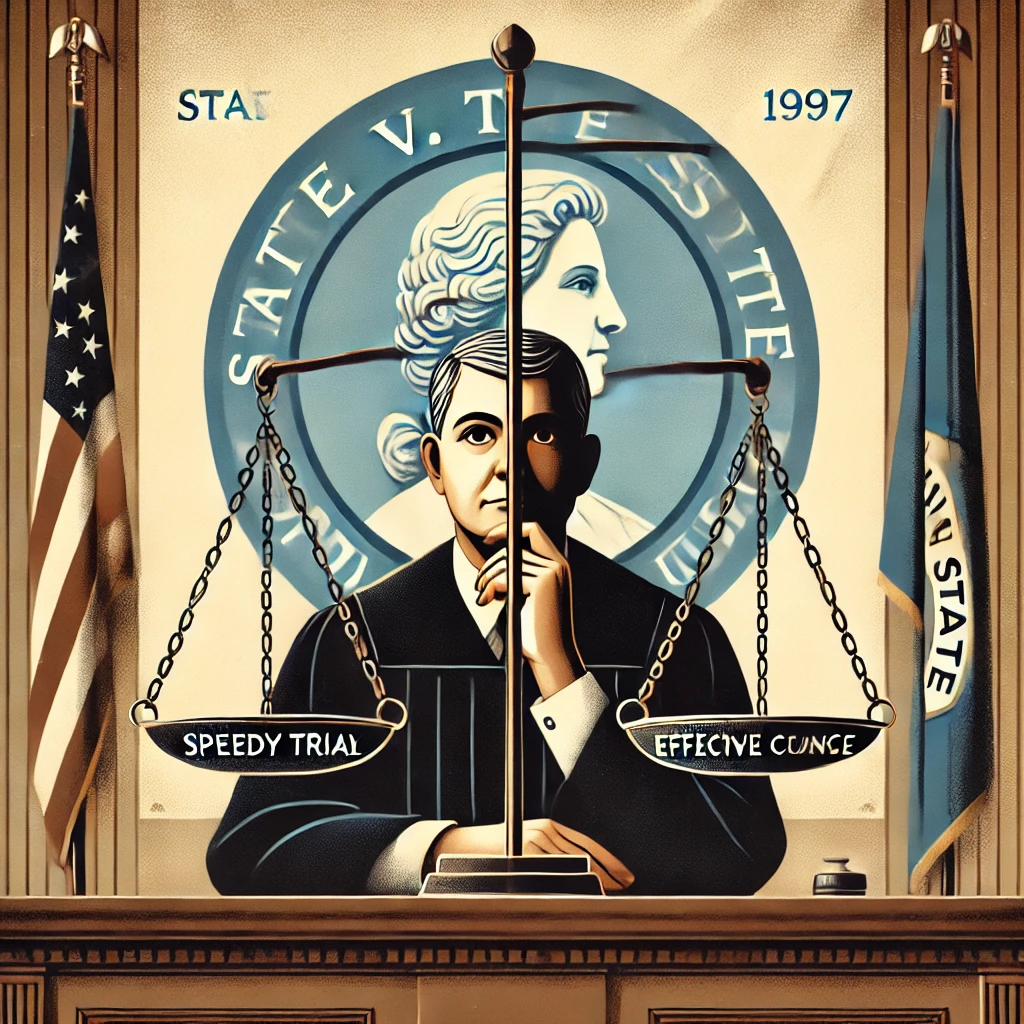The Washington Court of Appeals decision in State v. Jimmy R. Teems (1997) explores a defendant’s right to a speedy trial under Washington’s Criminal Rules of Procedure (CrR 3.3) and the need for effective legal counsel. The case emphasizes the importance of balancing these rights, as well as the consequences of prosecutorial mismanagement in criminal proceedings. Understanding the Court’s reasoning can be crucial for anyone navigating Washington’s criminal justice system.
Case Background
In State v. Teems, Jimmy R. Teems was charged with possession of marijuana over 40 grams on March 1, 1996. Before the trial, Teems requested a new attorney, and his case was severed from a co-defendant’s. After a mistrial was declared on June 21 due to a hung jury, his defense attorney, John Sloan Jr., filed a motion to withdraw from the case. The court granted this request, and the State of Washington refiled its charges against Teems.
The prosecutor notified the wrong attorney—John Sloan Jr.—despite knowing he was no longer representing Teems. As a result, Teems was unaware of the new charges until August 29. When Teems was finally informed, only 12 days remained until the expiration of his speedy trial rights under CrR 3.3. Due to this delay, his new defense attorney, Ryan D. Whitaker, had insufficient time to prepare an adequate defense. Consequently, Teems was faced with the dilemma of choosing between his speedy trial rights and the need for effective legal representation.
Trial Court’s Decision to Dismiss
Teems’s counsel filed a motion to dismiss the charges, arguing that the delay prejudiced Teems’s ability to have a fair trial. The trial court agreed, holding that the State’s mismanagement left Teems in a position where he had to choose between his right to a speedy trial and his right to effective assistance of counsel.
The trial court dismissed the charges under CrR 8.3(b), which allows dismissal of criminal cases if a defendant’s rights are prejudiced due to prosecutorial mismanagement. The State appealed the dismissal, arguing that the court abused its discretion.
Key Legal Issues in State v. Teems
The Washington Court of Appeals had to determine whether the trial court’s decision to dismiss the case due to prosecutorial mismanagement was appropriate. Two primary questions were at stake:
- Did the State’s actions violate Teems’s right to a speedy trial?
- Did the State’s failure to notify Teems of the refiling and subsequent delay deprive him of effective legal representation?
The court concluded that the prosecutor’s mismanagement—failing to notify Teems directly and only informing his former attorney—jeopardized Teems’s rights. While the State argued that there was no intentional misconduct, the Court of Appeals ruled that even simple mismanagement can justify dismissal if it forces a defendant into an untenable position, as in Teems’s case.
Court’s Ruling: Affirmed Dismissal Under CrR 8.3(b)
The Court of Appeals upheld the trial court’s decision, noting that the unique circumstances justified the dismissal. The State’s actions effectively limited Teems’s right to have adequate legal representation while honoring the speedy trial rules of CrR 3.3.
Under CrR 8.3(b), a court can dismiss a case if prosecutorial misconduct or mismanagement deprives a defendant of a fair trial. The appellate court emphasized that “governmental misconduct need not be of an evil or dishonest nature; simple mismanagement is sufficient” (State v. Michielli, 1997).
Impact on Washington State Criminal Law
The ruling in State v. Teems is a pivotal example of how prosecutorial mismanagement can affect a defendant’s rights. The case serves as a reminder that trial courts have the authority and responsibility to ensure fair trials, even if that means dismissing charges due to a prosecutor’s failure to follow proper procedures.
This case continues to influence decisions regarding speedy trial rights, effective counsel, and case dismissals under CrR 8.3(b) in Washington State.
Blanford Law: Protecting Your Legal Rights
If you or a loved one is navigating the complexities of Washington’s criminal justice system, it’s crucial to have an experienced attorney on your side. The attorneys at Blanford Law understand the intricacies of Washington’s criminal rules, including CrR 3.3 and CrR 8.3(b), and can effectively represent you to ensure your speedy trial rights and the right to effective assistance of counsel are fully protected.
Contact Blanford Law
For more information or to speak with a skilled criminal defense attorney, contact Blanford Law today at www.blanfordlaw.com, email info@blanfordlaw.com, or call 253-720-9304. We are here to help ensure your rights are upheld and that you receive fair treatment throughout your case.
Conclusion
The State v. Teems case highlights the importance of balancing a defendant’s right to a speedy trial with the need for effective counsel. The Court of Appeals of Washington’s decision to affirm the dismissal under CrR 8.3(b) due to prosecutorial mismanagement sets a crucial precedent for similar cases. Understanding these rights and how they apply is essential for anyone involved in the criminal justice system in Washington State.

Additional Resources
- WAC 308-19-160 Employment Change Reporting for Bail Bond Agents
Explains the mandatory reporting requirements for bail bond agencies and agents in Washington under WAC 308-19-160. - Baby Driver Crimes Under Washington State Law
Analyzes the criminal actions in Baby Driver and how they would be charged under Washington statutes. - Utah Man Injured in Motorcycle Crash: Washington Law & Legal Recourse
Highlights personal injury law considerations when out-of-state residents are involved in accidents in Washington. - State v. Amurri: Reckless vs. Negligent Driving in Washington
Breaks down how Washington courts interpret reckless and negligent driving, with legal lessons from State v. Amurri. - RPC 2.1 Lawyer as Advisor: Ethics, Judgment & Candid Legal Advice
Discusses the responsibilities of Washington lawyers under RPC 2.1 to provide ethical and well-rounded legal advice.
